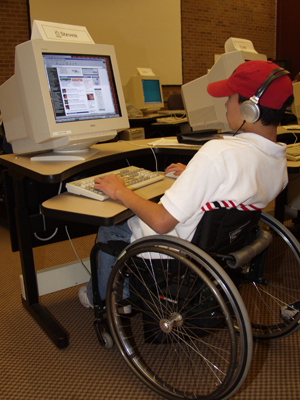Introduction (Access to Computing in Higher Education 2009)

A series of activities were undertaken to better understand the under-representation and increase the participation of students with disabilities in computing and information technology (IT) academic and career fields. These activities were funded by the National Science Foundation (grant #CNS-0540615 and #CNS-0837508). They were coordinated by the Alliance for Access to Computing Careers (AccessComputing) led by the Department of Computer Science and Engineering and DO-IT (Disabilities, Opportunities, Internetworking, and Technology) at the University of Washington (UW).
AccessComputing institutional partners are Gallaudet University, Landmark College, and Rochester Institute of Technology. AccessComputing alliance partners are the Alliance for Students with Disabilities in Science, Technology, Engineering, and Mathematics (AccessSTEM); EAST Alliance for Students with Disabilities in Science, Technology, Engineering, and Mathematics (EAST); Midwest Alliance in Science, Technology, Engineering, and Mathematics (Midwest); Reaching the Pinnacle (RTP); National Center for Women and Information Technology (NCWIT); National Girls Collaborative Project (NGCP); Commonwealth Alliance for Information Technology Education (CAITE); Computing Alliance of Hispanic-Serving Institutions; Empowering Leadership: Computing Scholars of Tomorrow; and Advancing Robotics Technology for Societal Impact Alliance (ARTSI).
Goal and Outcomes
AccessComputing works to increase the participation of people with disabilities in computing and IT fields. Collaborators apply evidence-based practices to:
- increase the number of students with disabilities successfully pursuing degrees and careers in computing fields
- increase the capacity of postsecondary computing departments to fully include students with disabilities in computing courses and programs
- create a nationwide resource to help students with disabilities pursue computing fields
- help computing educators and employers, professional organizations, and other stakeholders develop more inclusive programs and share effective practices nationwide
Capacity-Building Activities
AccessComputing collaborates with project partners in a variety of ways, to:
- conduct a Capacity-Building Institute (CBI)
- share results of the CBI with other institutions and individuals
- provide an electronic forum to continue discussion of veterans issues, and provide support of efforts to increase services and supports for veterans
- extend resources to other programs and promising practices via an online searchable AccessComputing Knowledge Base
Audiences for These Materials
This publication was created for people who:
- participated in the Access to Computing in Higher Education Capacity-Building Institute held in April 2009 in Seattle
- want to conduct a CBI at their institution, in their region, or at a national or international forum
- seek to increase their understanding of issues surrounding the underrepresentation and participation of students with disabilities in computing studies and careers
- are motivated to join an electronic community to discuss these issues
- would like to access resources for making their campus courses, services, and activities more welcoming and accessible to students with disabilities
- have promising practices for serving students with disabilities in computing to share with others